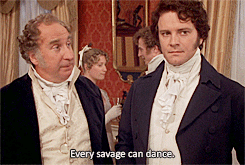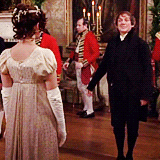Most of us know someone like this; someone who takes delight in being the bearer of bad news. Some in my family prefer to be the bearer of all the news, preferably the bad. And people, unless they are the subject of the news, want to hear it. As Clairee Belcher unabashedly said in Steel Magnolias, “Well, you know what they say: if you don’t have anything nice to say about anybody, come sit by me!”

Clairee Belcher (Olympia Dukakis) quote from Steel Magnolias, 1989.
Job’s Comforter
One who brings news of some additional misfortune.
Jane Austen wrote three characters specifically in Pride and Prejudice who enjoyed sharing bad news, especially with the objects of it: George Wickham, Aunt Phillips, and Mr. Collins.
Mr. Wickham:
Are you much acquainted with Mr. Darcy?”
“As much as I ever wish to be,” cried Elizabeth very warmly. “I have spent four days in the same house with him, and I think him very disagreeable.”
“I have no right to give my opinion,” said Wickham, “as to his being agreeable or otherwise. I am not qualified to form one. I have known him too long and too well to be a fair judge. It is impossible for me to be impartial. But I believe your opinion of him would in general astonish—and perhaps you would not express it quite so strongly anywhere else. Here you are in your own family.”
“Upon my word, I say no more here than I might say in any house in the neighbourhood, except Netherfield. He is not at all liked in Hertfordshire. Everybody is disgusted with his pride. You will not find him more favourably spoken of by anyone.”
“I cannot pretend to be sorry,” said Wickham, after a short interruption, “that he or that any man should not be estimated beyond their deserts; but with him I believe it does not often happen. The world is blinded by his fortune and consequence, or frightened by his high and imposing manners, and sees him only as he chooses to be seen.”
“I should take him, even on my slight acquaintance, to be an illtempered man.” Wickham only shook his head…
“I have been a disappointed man, and my spirits will not bear solitude. I must have employment and society. A military life is not what I was intended for, but circumstances have now made it eligible. The church ought to have
been my profession—I was brought up for the church, and I should at this time have been in possession of a most valuable living, had it pleased the gentleman we were speaking of just now.”
“Indeed!”
“Yes—the late Mr. Darcy bequeathed me the next presentation of the best living in his gift. He was my godfather, and excessively attached to me. I cannot do justice to his kindness. He meant to provide for me amply, and thought he had done it; but when the living fell, it was given elsewhere.”
“Good heavens!” cried Elizabeth; “but how could that be? How could his will be disregarded? Why did you not seek legal redress?”
“There was just such an informality in the terms of the bequest as to give me no hope from law. A man of honour could not have doubted the intention, but Mr. Darcy chose to doubt it—or to treat it as a merely conditional recommendation, and to assert that I had forfeited all claim to it by extravagance, imprudence—in short anything or nothing. Certain it is, that the living became vacant two years ago, exactly as I was of an age to hold it, and that it was given to another man; and no less certain is it, that I cannot accuse myself of having really done anything to deserve to lose it. I have a warm, unguarded temper, and I may have spoken my opinion of him, and to him, too freely. I can recall nothing worse. But the fact is, that we are very different sort of men, and that he hates me.”
“This is quite shocking! He deserves to be publicly disgraced.”
“Some time or other he will be—but it shall not be by me. Till I can forget his father, I can never defy or expose him.”
Elizabeth honoured him for such feelings, and thought him handsomer than ever as he expressed them.
“But what,” said she, after a pause, “can have been his motive? What can have induced him to behave so cruelly?”
“A thorough, determined dislike of me—a dislike which I cannot but attribute in some measure to jealousy. Had the late Mr. Darcy liked me less, his son might have borne with me better; but his father’s uncommon attachment to me irritated him, I believe, very early in life. He had not a temper to bear the sort of competition in which we stood—
the sort of preference which was often given me.”
“I had not thought Mr. Darcy so bad as this—though I have never liked him. I had not thought so very ill of him. I had supposed him to be despising his fellow-creatures in general, but did not suspect him of descending to such malicious revenge, such injustice, such inhumanity as this.”
After a few minutes’ reflection, however, she continued, “I do remember his boasting one day, at Netherfield, of the implacability of his resentments, of his having an unforgiving temper. His disposition must be dreadful.”
“I will not trust myself on the subject,” replied Wickham; “I can hardly be just to him.”
Pride and Prejudice, Chapter 16
Aunt Phillips:
My aunt Phillips came to Longbourn on Tuesday, after my father went away; and was so good as to stay till Thursday with me…”
“She had better have stayed at home,” cried Elizabeth; “perhaps she meant well, but, under such a misfortune as this, one cannot see too little of one’s neighbours. Assistance is impossible; condolence insufferable. Let them triumph over us at a distance, and be satisfied.”
Pride and Prejudice, Chapter 47
Mr. Collins:
…This letter is from Mr. Collins.”
“From Mr. Collins! and what can he have to say?”
“Something very much to the purpose of course. He begins with congratulations on the approaching nuptials of my eldest daughter, of which, it seems, he has been told by some of the good-natured, gossiping Lucases. I shall not sport with your impatience, by reading what he says on that point. What relates to yourself, is as follows: ‘Having
thus offered you the sincere congratulations of Mrs. Collins and myself on this happy event, let me now add a short hint on the subject of another; of which we have been advertised by the same authority. Your daughter Elizabeth, it is presumed, will not long bear the name of Bennet, after her elder sister has resigned it, and the chosen partner of
her fate may be reasonably looked up to as one of the most illustrious personages in this land.’
“Can you possibly guess, Lizzy, who is meant by this?” ‘This young gentleman is blessed, in a peculiar way, with every thing the heart of mortal can most desire,—splendid property, noble kindred, and extensive patronage. Yet in spite of all these temptations, let me warn my cousin Elizabeth, and yourself, of what evils you may incur by a precipitate closure with this gentleman’s proposals, which, of course, you will be inclined to take immediate advantage of.’
“Have you any idea, Lizzy, who this gentleman is? But now it comes out:
“ ‘My motive for cautioning you is as follows. We have reason to imagine that his aunt, Lady Catherine de Bourgh, does not look on the match with a friendly eye.’
“Mr. Darcy, you see, is the man! Now, Lizzy, I think I have surprised you. Could he, or the Lucases, have pitched on any man within the circle of our acquaintance, whose name would have given the lie more effectually to what they related? Mr. Darcy, who never looks at any woman but to see a blemish, and who probably never looked at you in
his life! It is admirable!”
Elizabeth tried to join in her father’s pleasantry, but could only force one most reluctant smile. Never had his wit been directed in a manner so little agreeable to her.
“Are you not diverted?”
“Oh! yes. Pray read on.”
“ ‘After mentioning the likelihood of this marriage to her ladyship last night, she immediately, with her usual condescension, expressed what she felt on the occasion; when it become apparent, that on the score of some family objections on the part of my cousin, she would never give her consent to what she termed so disgraceful a match.
I thought it my duty to give the speediest intelligence of this to my cousin, that she and her noble admirer may be aware of what they are about, and not run hastily into a marriage which has not been properly sanctioned.’ Mr. Collins moreover adds, ‘I am truly rejoiced that my cousin Lydia’s sad business has been so well hushed up, and am
only concerned that their living together before the marriage took place should be so generally known. I must not, however, neglect the duties of my station, or refrain from declaring my amazement at hearing that you received the young couple into your house as soon as they were married. It was an encouragement of vice; and had I been the rector of Longbourn, I should very strenuously have opposed it. You ought certainly to forgive them, as a Christian, but never to admit them in your sight, or allow their names to be mentioned in your hearing.’ That is his notion of Christian forgiveness! The rest of his letter is only about his dear Charlotte’s situation, and his expectation of a young olive-branch. But, Lizzy, you look as if you did not enjoy it. You are not going to be missish, I hope, and pretend to be affronted at an idle report. For what do we live, but to make sport for our neighbours, and laugh at them in
our turn?”
“Oh!” cried Elizabeth, “I am excessively diverted.
Pride and Prejudice, Chapter 57
Slang term taken from the 1811 Dictionary of the Vulgar Tongue.






You must be logged in to post a comment.